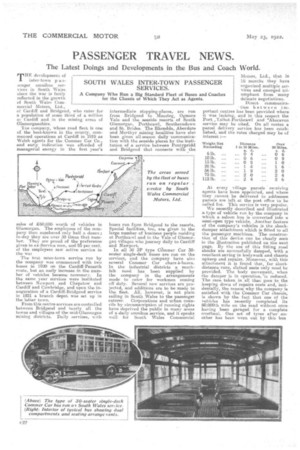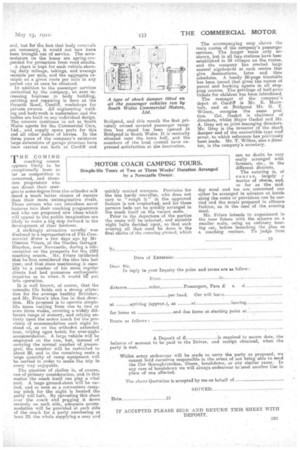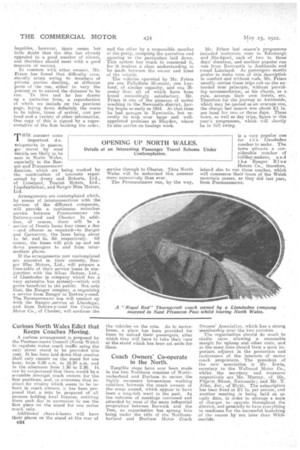PASSENGER TRAVEL NEWS.
Page 22

Page 23

Page 24

If you've noticed an error in this article please click here to report it so we can fix it.
The Latest Doings and Developments in the Bus and Coach World.
SOUTH WALES INTER-TOWN PASSENGER SERVICES.
A Company Who Run a Big Standard Fleet of Buses and Coaches for the Chassis of Which They Act as Agents. THE development of inter-town p a 5senger omnibus services in South Wales since the war is fairly reflected in the growth of South Wales Cornmercial Motors, Ltd.,
of Cardiff and Bridgend, who cater for a population of some third of a million at Cardiff and in the mining areas of Glamorganshire.
Me company, whose road fleet is one of the best-known in the county, commenced operations at Cardiff in 1919 as Welsh agents for the Commer Car Co., and early indication was afforded of managerial energy in the first year's sales of £60,000. worth of vehicles in Glamorgan. The employees of the company then numbered only half a dozen ; to-day they are over 30 times that number. They are proud of the preference given to ex-Service men, and 95 per cent. of the employees saw active service in the wat
The first inter-town service run by the company was commenced with two buses in 1920 On the Cardiff-Penarth route, but an early increase in the number of vehicles became necessary. in the same year services were instituted between Newport and Chepstow and Cardiff and Cowhridge, and upon the inauguration of a Cardiff-Bridgend service in 1921 a branch depot, was set up in the latter town.
From this centre services are controlled between Bridgend and nearly all the towns and villages of the mid-Glamorgan mining districts. Daily services, with intermediate stopping-places, are run from Bridgend to Maesteg, Ogmore Vale and the seaside resorts of South Glamorgan, Porthcawl, Southerndown and St. Brides. The Rhondda, Aberdare and Merthyr mining localities have also been given all-season daily 'communication with the seaside places by the institution of a service between Pontypridd and Bridgend that connects with the buses run frpm Bridgend to the resorts, Special facilities, too, are given to the large number of business people residing at Portheawl and in the Vale of Glamorgan villages who journey daily to Cardiff and Newport.
In all 30 3P type anmer Car 30seater single-deck buses are run on the services, and the company have also several Commer Car chars-A.-banes. In the industrial districts a muchfelt need has been supplied by the company in the arrangements made to cater for workmen coming off duty. Several new services are projected, and additions are to be made to the fleet. All. however, is not plain sailing in South Wales to the passenger caterer. Corporations and urban councils by circumscription of running rights have deprived the public in many areas of a daily omnibus service, and it speaks well for South Wales Commercial
Motors, Ltd., that in 18 months they have organized multiple services and emerged triumphant frommany delicate negotiations.
Direct communica tion between important centres has been provided where it was lacking, and in this respect the Port „Talbot-Porthcawl and *Aberavon service may be cited. On all routes a parcel delivery service has been established, and the rates charged may be of interest :
Weight Not Distance Over Exceeding I to ld Miles. 20 a. d, s. d.
6 lb. 0 4 0 6 10th. 0 6 0 9 151b. 0 9 1 0 28 lb. ••• 1 4 1 6 561b • • • 1 9 ... 2 0 751b 20 ... 24 1121b 2 4 ... 2 6 At every village parcels receiving agents have been appointed, and where they cannot be delivered to addressee parcels are left at the post office to be called for. This service is verypopular.
We recently described and illustrated a typo of vehicle run by the company in which a saloon bus is converted into a semi-open type vehicle. Another feature of the company's vehicles is the shockdamper attachment which is fitted to all the passenger machines. The construction of this device can be clearly seen in the illustration published on the next page. By the use of this fitting road shocks are successfully damped, with a resultant saving in bodywork and chassis upkeep and repairs. Moreover, with this attachment it is found that, for shortdistance runs slatted seats only need be provided. Tih3 body movement, when the damper is in operation, 'is reduced. The care taken in all that goes to the keeping down of repairs costs and, incidentally, the reason why the company is satisfied with the Conamer Car chassis, is shown by the fact that one of the vehicles has recently competed its 60,060th mile on the road without once having been garaged, for a complete overhaul. One set of tyres after another has been worn out by this bus
and, but for the fact that body renewals are necessary, it would not now have been brought out of service. The accumulators on the buses are spring-suspended for protection from road shocks. A chart is kept for each vehicle showing daily mileage, takings, and average receipts per mile, and the aggregate receipts on a given route per mile in any period can at once be obtained.
In addition to the passenger services controlled by the company, an ever ins creasing business in body building, painting and repairing is done at the i'enarth Road, Cardiff, workshops for private. owners. All engineering welding and bodywork is undertaken and the bodies are built to any individual design. The
concern continues to act as South Wales agents for the Commercial Cars, Ltd., and supply spare parts for this and all other makes of lorries. In the three years of the company's existence large extensions of garage premises have been carried out both at Cardiff and Bridgend, and this month the first privately owned covered passenger reception bus stand has been opened at Bridgend in South Wales. It is centrally situated near the town hall, and the members of the local council have expressed satisfaction at the innovation.
The accompanying map allows the main routes of the company's passenger services. The longer tours only are shown, but in all fare stations have been established in 94 villages on the routes, and the company has erected large enamel signboards at each centre that give destinations, fares and time schedules. A handy 50-page timetable has been issued that gives the names of parcel and booking agents in all stopping centres. The privilege of half-price tickets for children has been introduced, The manager of the company's depot at Cardiff is Mr. E. Mountain, and at Bridgend Mr. G. T. Wilcox, occupies the same position. Col. Gaskel is chairman of directors, whilst Major Gaskel and Mr. A. Gray act as joint managing directors. Mr. Gray is the inventor of the shock damper and of the convertible type roof cover, to which reference has previously been made. Mr. T. Wilkes, also a direc• tor, is the company's secretary.
MOTOR COACH CAMPING TOURS.
Simple-life Tours of Two or Three Weeks' Duration Arranged by a Newcastle Owner. THE COMING coaching season appears likely to be exceptionally keen so tar as competition is concerned, and therefore proprietors who can divest their ener
gies to some degree from the orthodox wia stand a much better chance of success than their more unimaginative rivals. Those owners who can introduce novel features into their coaching programmes and who can propound new ideas 'which will appeal to the public imagination are Likely to make a big step forward in the development of their business.
A strikingly attractive novelty. was disclosed to a representative of The Coinmenial Motor a few days ago by Mr Glenton 'Friars, of the Garden Garages 13laydon, near Newcastle, during a versation on the prospects for the 1922 coaching season. Mr. Friars intifaated that he first considered the idea late last year, and that since mentioning it casually to a number of his more regular clients had had numerous enthusiastic inquiries as to when it would b put into operation.
It is well known, of course, that the nomadic life holds out a strong attraction for the average healthy Britisher, and Mr. Friars's idea lies in that direction. His proposal is to operate simplelife tours varying from one to two or even three weeks, covering a widely different range of scenery, and relying entirely upon the motor coach for the provision of accommodation each night instead of, as on the orthodox extended tour, relying upon hotels for over-night accommodation. A large vehicle will be employed on the run, but, instead of carrying the normal number of passengers, the number will be restricted to about 20, and in the remaining seats a large quantity of camp equipment will be carried in order to make the trip in every way enjoyable.
The question of shelter is, of course, one of primary consideration, and in this matter the coach itself can play a vital part. A latge ground-sheet will be carried, and so soon as a convenient camping pitch for the night is located the party will halt. By spreading this sheet over the coach and pegging it down securely on each side,. adequate accommodation will be provided at each aide of the coach for a party numbering at least 20, the whole supplying a cosy and
quickly erected marquee. Provision for the less hardy traveller, who does not care to "rough it" in the approved fashion is not overlooked, and for these persons beds can be quickly arranged in the coach itself on the vacant seats.
Prior to the departure of the parties the route will be selected, and suitable night halts decided npon, so that each evening all that need be done is the final choice of the camping ground, which
can no doubt be very easily arranged with farmers, etc., in the different districts.
The catering is, of course, largely matter of encase, and, so far as the midday meal and tea are concerned can either be arranged in advance at hotels along the route or provisions can be carried and the meals prepared in alfresco fashion, as in the case of the evening meal.
Mr. Friars intends to experiment in the near future with the scheme on a smaller scale, using an ordinary touring car, before launching the plan as a coaching venture. To judge from
inquiries, • however, there seems bat little doubt that the idea has already appealed to a good number of clients,. and therefore should meet with a good measure of success.
In common with other owner's, Mr_ Friars has found that difficulty occasionally arises owing tomembers of private parties desiring, at different parts of the run, either to vary the journey or to extend the distasice to be run. To this end he has drawn up a quotation form, a reproduction of which we include on the previous page, laying down definitely the route to be taken, times of arrival, cost per head and a variety of other information. One copy of this is signed by a representative of the firm banking the order, and the other by a responsible member of the party, accepting the quotation and agreeing to the particulars laid down. This system has much to commend it, for it enables a clear understanding to be made between the owner and hiresof the vehicle.
The vehicles operated by Mr. Friars are one Palladium 28-seater, one Leyland, of similar capacity, and one 26seater Star, all of which have been found exceedingly satisfactory. Mr. Friars is one of the pioneers of motor coaching in the Newcastle district, having begun as early as 1814. At that, time he had garages in Newcastle, but recently he tools over large and wellappointed premises at 'Blaysion, where be also carries on haulage work. Mr. Friars last season's programme included numerous runs to Edinburgh and Blackpool, each of two to three days' duration, and another popular run was from Newcastle to Ambleside and round Lakeland. As passengers mostly. prefer to make runs of this description in comfort and without rush, Mr. Friars usually carries these trips out on the extended tour principle, without providing accommodation, as his clients, as a. rule, arrange their own hotels, etc. Therefore for the journey to Ambleside, which may be quoted as an average one, the charge last season was about 1 Is. per head for two or three days. These tours, as well as day trips, figure in this year's programme, which • will shortly be in full swing.
OPENING UP NORTH WALES. THIS summer some
important d evelopmeate in passenger travel by road vehicle are likely to be seen in North Wales, especially in the Bangor and l'enmaenniaisr districts, which are being worked by the combination of interests represented by Avery and Roberts, Ltd., of Liverpool, Tourist Hotels, Ltd., Llanfairfechan, and Bangor Blue Motors,
Arrangements are contemplated which, by means of interconnections with the servicas of the different companies, will provide a• continuous motorbus service between Penmaenmawr via Dettsvs-y-coed and Chester. In addition, a course, there will be a service of Dennis buses four times a day —and oftener as required—to Bangor and Carnarvon, the fares being about
is. 6d. and 2s. 8d. respectively. Of course, the buses will pick up and Set down passengers to and from intermediate places.
If the arrangements now contemplated are executed in their entirety, Bangor Blini Motors, Ltd., will prepare a time-table of their service .buses in conjunction with the Silver Motors, Ltd., of Llandudno (a company which has a very extensive bus system)—which will prove beneficial to the public. Not only that, the Bangor zompany „Ls organizing a service from Bangor to Lettava-y-coed. The Peranaenmawr bus will connect up with the Bangor *service at Ltanclegai, and from Bettws-y-coed the Crosville Motor Co., of Chester, will continue the
service through to Cheater. Thus North Wales will be motorized this summer more extensively than ever. The Penmaenmawr run, by the way, is a very popular one for t h e Llandudno coaches to make. The town attracts a considerable number of holiday-makers, an d the Bangor Blue Motors Co., therefore, intend also to run three coaches, which will commence their' tours of the Welsh mountain passes, as they did last year, from Penmaenmawr.
Curious North Wales Edict that Keeps Coaches Moving.
A curious arrangement is proposed by the Penmaerimawr Council (North Wales.) to regulate motor coach traffic using the only street stand to be provided this year. It has been laid down that coaches shall only remain on the stand for one hour, from 0.30 a.m. to 10.30 a.m. and in the afternoon from 1.30 to 2.30.
can be conjectured that there would be a scramble amongst coach owners for the first positions, and, to overcome that instinct for rivalry which seems to be inborn in coach owners, it has been proposed that that at rota be prepared of all persons holding local licences, entitling them each day in succession to use the first place on the stand for one motor coach only.
Additional chars-a-bancs will have their places on the stand at the rear of 024 the vehicles on the rota. As to motorbuses, a place has been provided for them to unload their passengers, after avhich they will have to take their turn at the stand which has been set aside for. them.
Coach Owners' Co-operate in the North.
Tangible steps have now been made In the two Northern counties of Northumberland and Durham to secure the highly necessary harmonious working relations between the coach owners of the areas named, which appear to have been a long-felt want in the past. As the °amine of meetings convened and attended by most of the more influential proprietors between Berwick and the Tees, an organization has sprung into being under the title of the Northumberland and Durham Motor Coach Owners' Association, which has a strong 'membership over the two counties.
The organization should do much to obtain rates allowing a reasonable margin for upkeep and -other costs, and at the same time should form a most important adjunct in the protection and furtherance of the interests of motor coach proprietors. The president of the new association is Mr. Irwin, secretary to the Wallsend Motor Co., whilst the secretary and treasurer respectively are Mr. Murray, of 16a, Pilgrim Street, Newcastle; and Mr. T. Allen, 'Ina, of Blyth. The subscription
ha a been fixed at is. per annum, and another meeting us being held at an early date, in order to arrange a scale of charges to operate throughout the district, and generally to have everything in readiness for the successful launching of the season by not later than Whitsnntide.






























